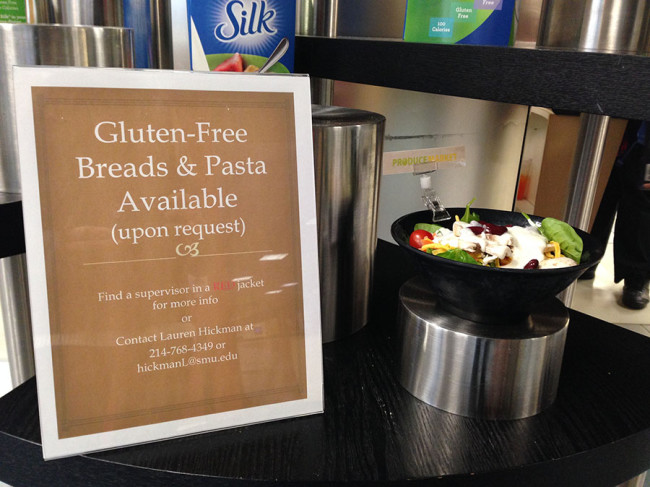SMU cross-country
runner Caitlin Keen has improved her athletic performance in the past year.
Like many other athletes, she has noticed a difference in her body due to a
change in diet – one that has
become very popular today, known as the “gluten-free” diet.
“Before I always felt sluggish, tired, and on the verge of catching the next illness going around the dorm,” Keen said. “Since I’ve become gluten-free I’ve dropped a significant amount of time from my personal best and haven’t missed practice for days at a time because I was too sick to be around the team.”
“Gluten-free” means that an individual cannot eat any wheat, barley, or rye. Typically those who give up gluten from their diets have celiac disease or some sort of wheat allergy. However, nowadays more and more people have gluten sensitivities and intolerances that weren’t present before. On top of that, it has become a fad diet, the latest trend in health news. Now, grocery stores aisles, restaurants, and college dining halls even have gluten-free options and sections available due to the high demand.
“Diet books started to come out saying nobody should eat gluten. This really started the trend,” Eve Pearson, adjunct instructor for SMU’s Department of Applied Physiology and Wellness, said. “The Wheat Belly Diet blamed gluten for obesity in America, when there are actually a lot of other factors.”
“Gluten-free” has become mainstream, with major companies like General Mills Inc. and the Kellogg Co. producing gluten-free products. Dunkin’ Donuts even announced this year it would offer gluten-free doughnuts and muffins. However, that doesn’t mean it is necessarily the healthier alternative. A Dunkin’ Donuts wheat-less doughnut has 320 calories and a regular glazed doughnut has 260 calories.
This presents the main issue of this diet trend – “gluten-free” doesn’t mean calorie free, which denotes the question: is giving up gluten the healthier choice?
“Gluten-free is not healthier by any means,” Pearson said. “A lot of gluten-free products actually have a lot more fat and are missing the nutrition from wheat and barley. Just because its gluten-free bread doesn’t mean it’s healthier than regular bread.”
Regardless, more and more Americans are eating gluten-free, which could be attributed to the growing hype around the diet. People are ridding their diets of gluten without knowing the true health benefits and if there are any. Some people are simply giving up gluten because it’s the trendy thing to do. Celebrities like Miley Cyrus, Victoria Beckham, and Gwyneth Paltrow announced their gluten-free lifestyles to stay healthy, not because of a wheat allergy or celiac disease.
“The gluten-free diet is a trend now. Like anything else trendsetters of society including the media, celebrities, models, and athletes endorse, there is going to be a craze about,” Natalie Konstant, SMU senior with celiac disease, said. “Society looks up to these people, whether or not we should, so when Olympic athletes and Victoria Secret models are talking about gluten-free, the word is going to spread fast.”
According to Natural News, one-third of Americans now have reduced gluten from their diets. There has also been an increase on SMU’s campus.
“Umphrey Lee has a ‘gluten-friendly’ station in the dining hall in response to the high demand of gluten-friendly requests within the SMU community,” SMU’s Dining Services Registered Dietitian Lauren Hickman said. “As with any new ‘diet,’ I believe people are always looking for new ways to lose weight. Those who believe a gluten-free diet will help them lose weight are mistaking the true purpose of a gluten-free diet.”

Many people believe that just because something is labeled “gluten-free” it is good for you, but that is not necessarily the case.
“People are not cleaning up their diets if they are just finding replacement products,” Pearson explained. “Gluten-free chips are still chips, and gluten-free brownies are still brownies.”
The way to be healthier on a gluten-free diet is by transitioning to more natural foods – not by simply eating “gluten-free” substitutions.
“I had to transition to eating a lot more natural goods that are not processed. Now I eat a lot of rice, oats, eggs, peanut butter, fruits, vegetables, and meat,” Keen said of her new gluten-free lifestyle. “I guess you could say that it comes pretty close to the Paleo diet, but I’m not perfect and have my weaknesses.”
Although Keen has chosen a gluten-free lifestyle, others do not have that choice. People with celiac disease cannot have any trace of gluten or they will become sick and can lead a very uncomfortable lifestyle if not diagnosed.
“I would have terrible stomach aches every four to six hours during the day and night,” Konstant said. “Additionally, before I was diagnosed I was very pale, had thin hair, and was scary skinny. Celiac disease untreated stops the body from absorbing nutrients, so that’s why I had those symptoms. Within a month of my diagnosis and following the gluten-free diet, all of my symptoms were gone.”
Celiac disease is the most serious of allergies to gluten. However, other types of sensitivities and intolerances have recently become more present than before, and it is still unclear why.
“One reason being explored is that food is more genetically modified, and processed, now more than ever,” Pearson said. “There are people with more gluten sensitivities these days, and science is trying to figure out why.”
SMU senior Paige Corwin is one of them. She was recently tested and found that she has gluten intolerance and has observed changes since giving it up.
“I’ve noticed a difference in my energy level, my GI tract is healthier, and my skin is clearer,” Corwin said.
However, giving up gluten isn’t necessarily the cause.
“People just believe they feel better because when they cut gluten out. They are also eating a little healthier,” Pearson said.
Whether gluten is the cause or not, a cleaner diet can cause positive changes in the body, including increased energy levels. This is the main reason why many athletes are eating a gluten-free diet.
“My brother, who follows a gluten-free diet as strictly as I do, is a marathon runner and qualified for the Boston Marathon when he was on a gluten-free diet,” Konstant said. “It allows for much more energy, higher stamina, and rids your body from the toxins that are in bread and other wheat manufactured products today.”
Cross-country runner Keen agrees.
“My running has improved because my body has the energy to function how it should,” Keen said.









